Just a few years ago, nearly everyone in Maotai was involved in the baijiu business — and even those who weren’t hoped to get in on the action. “You could have opened a distillery in your bathroom,” says Chen Qiyong, who worked in a baijiu factory while the industry was booming between 2008 and 2012.
But all that changed when Chinese leader Xi Jinping launched his anti-corruption drive in 2012. As both high- and low-ranking cadres faced investigation, baijiu — often consumed at lavish banquets and used as a gift to ply government officials — fell out of favor.
Sales dropped so much that Chen’s former employer had to halt production, and Chen was laid off. Abandoned distilleries throughout Maotai still bear witness to the sudden and unexpected downfall of the national liquor.
But as the town’s small, family-owned distilleries struggle to cope with the aftermath of the anti-corruption sweep, one company appears to have made a comeback: Kweichow Moutai, the most prestigious baijiu brand in China and the town’s largest producer. Moutai’s top-priced product goes for nearly 18,000 yuan ($2,700) a bottle — making it the world’s most expensive liquor.
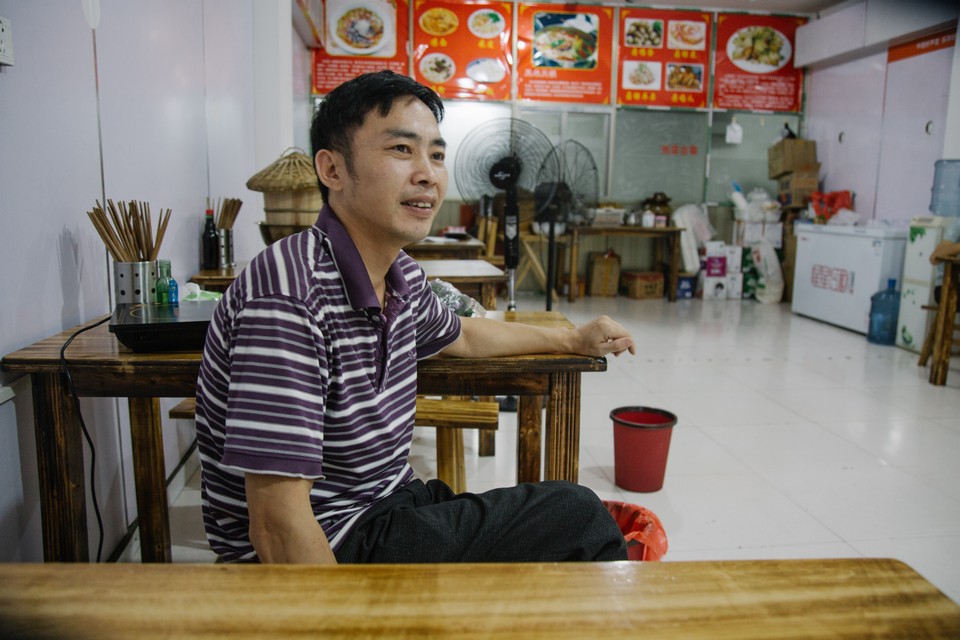
Chen Qiyong poses for a photo in his hot pot restaurant in Maotai Town, Guizhou province, July 18, 2017.
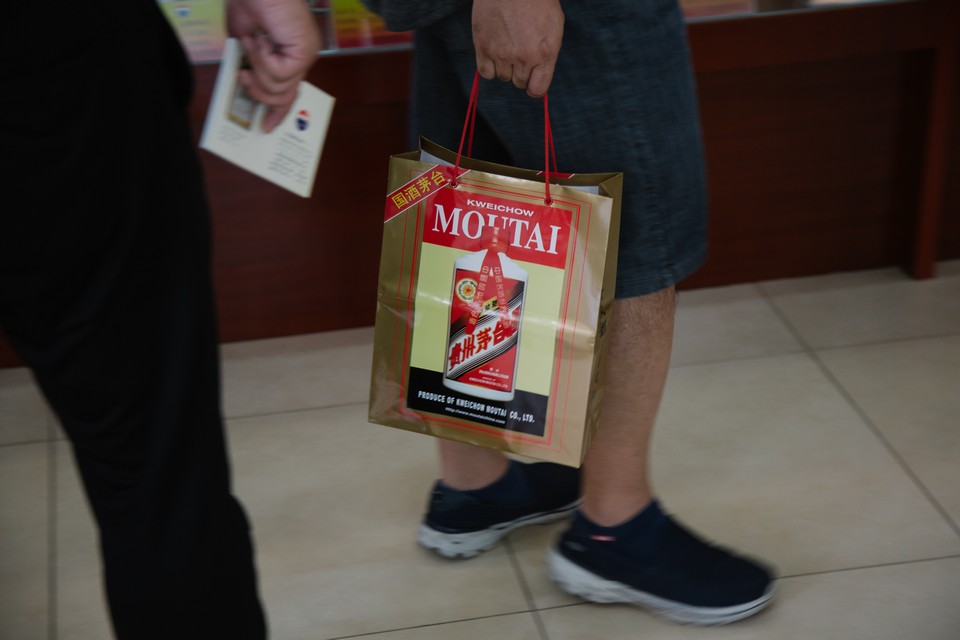
A tourist carries a bag of souvenirs on his way out of the ‘baijiu’ museum in Maotai Town, Guizhou province, July 14, 2017. Visitors are only allowed to purchase two bottles of Kweichow Moutai’s best-selling product from the museum gift shop.
Kweichow Moutai was hit hard by the crackdown: A documentary from state broadcaster China Central Television revealed that while government officials accounted for 30 percent of the company’s baijiu sales volume in 2012, that number had dropped to less than 1 percent by 2014.
But Moutai quickly adapted by diversifying its product range, offering more mid-level options priced at around 300 yuan a bottle to appeal to the general public. One of its latest offerings is a blueberry-flavored baijiu mixed drink targeted at young women: With 8 percent alcohol by volume compared with baijiu’s typical 52 percent, the beverage is packaged in slim, colorful bottles priced at 78 yuan apiece. Product placements have appeared in popular shows like “Ode to Joy,” a TV drama that follows the lives of five urban women.
Kweichow Moutai’s pivot to the mass market, particularly younger drinkers, is a fair bet, according to market research firm Mintel: A June report suggests that the baijiu industry’s future customers will be the middle class rather than officials and the ultra-wealthy.
A behind-the-scenes look at ‘baijiu’ fermentation, the first step in the production cycle.
Like most liquor, baijiu is an acquired taste. Foreigners often describe the sorghum-based drink as off-putting. But as China’s global influence grows — along with Chinese communities abroad — Kweichow Moutai managed to increase its overseas sales revenue to 2 billion yuan in 2016, up 28 percent from the previous year and almost double that of 2012. To further court international drinkers, Kweichow Moutai has created recipes for baijiu-based cocktails served in bars in Hong Kong, the U.S., and Russia. The company now works with 104 sellers in 66 countries and expects its overseas sales volume to account for 10 percent of total sales by 2020, up from 5.2 percent in 2016.
Kweichow Moutai’s comeback hasn’t been free of stumbling blocks — the company’s stock price soared to a record high of over 700 yuan in mid-November, before tumbling the next day after state news agency Xinhua warned against speculating — but the company is optimistic about its prospects. Moutai surpassed British distiller Diageo, which owns Johnnie Walker whiskey, to become the most valuable liquor company in the world last year. In early December, the company announced plans for a 3.56 billion-yuan expansion that will boost annual production — which hit 60,000 tons in 2016 — by over 5,000 tons.
-
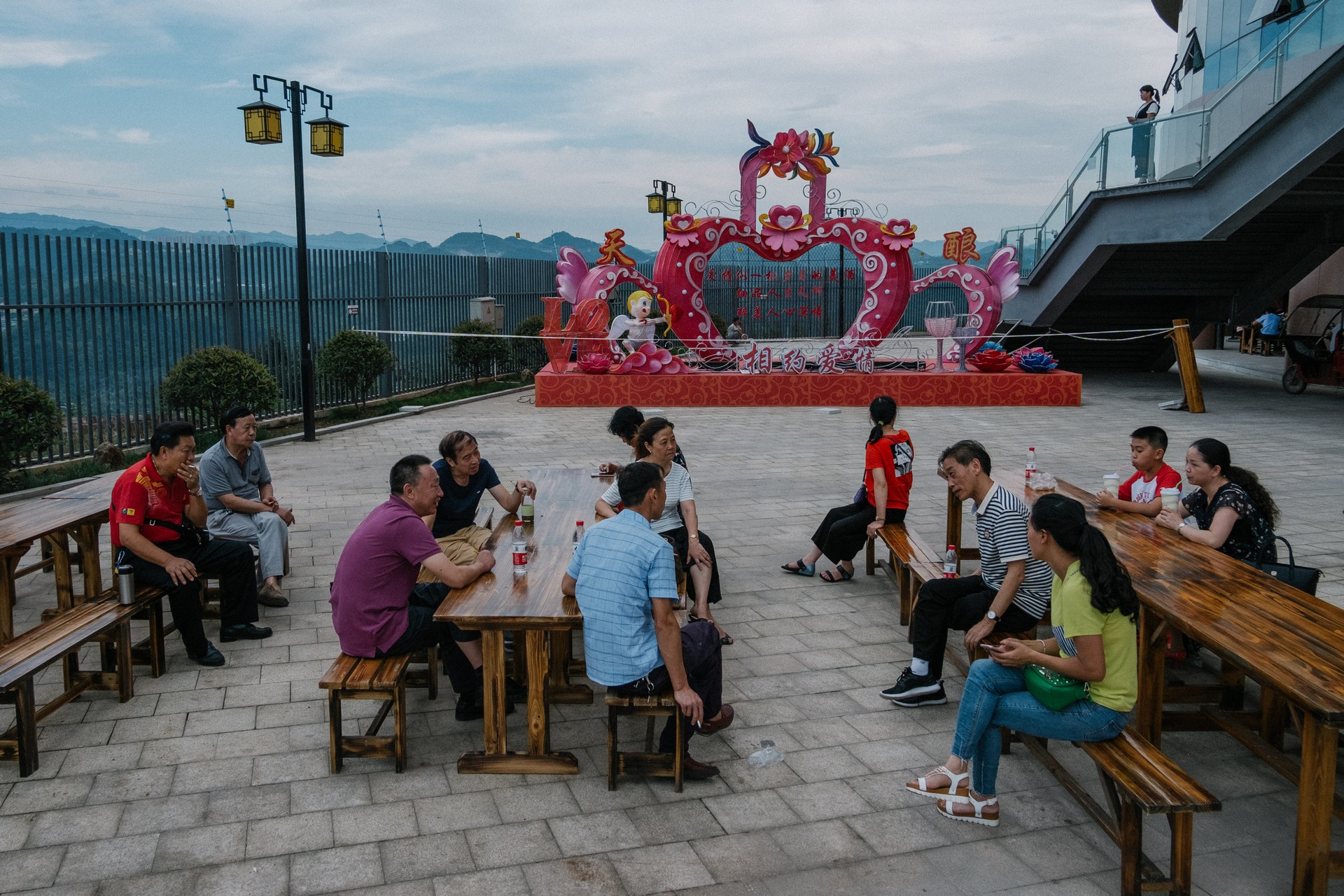
Tourists visit Tian’niang, a scenic area whose name translates as ‘god-made,’ in Maotai Town, Guizhou province, July 13, 2017.
-
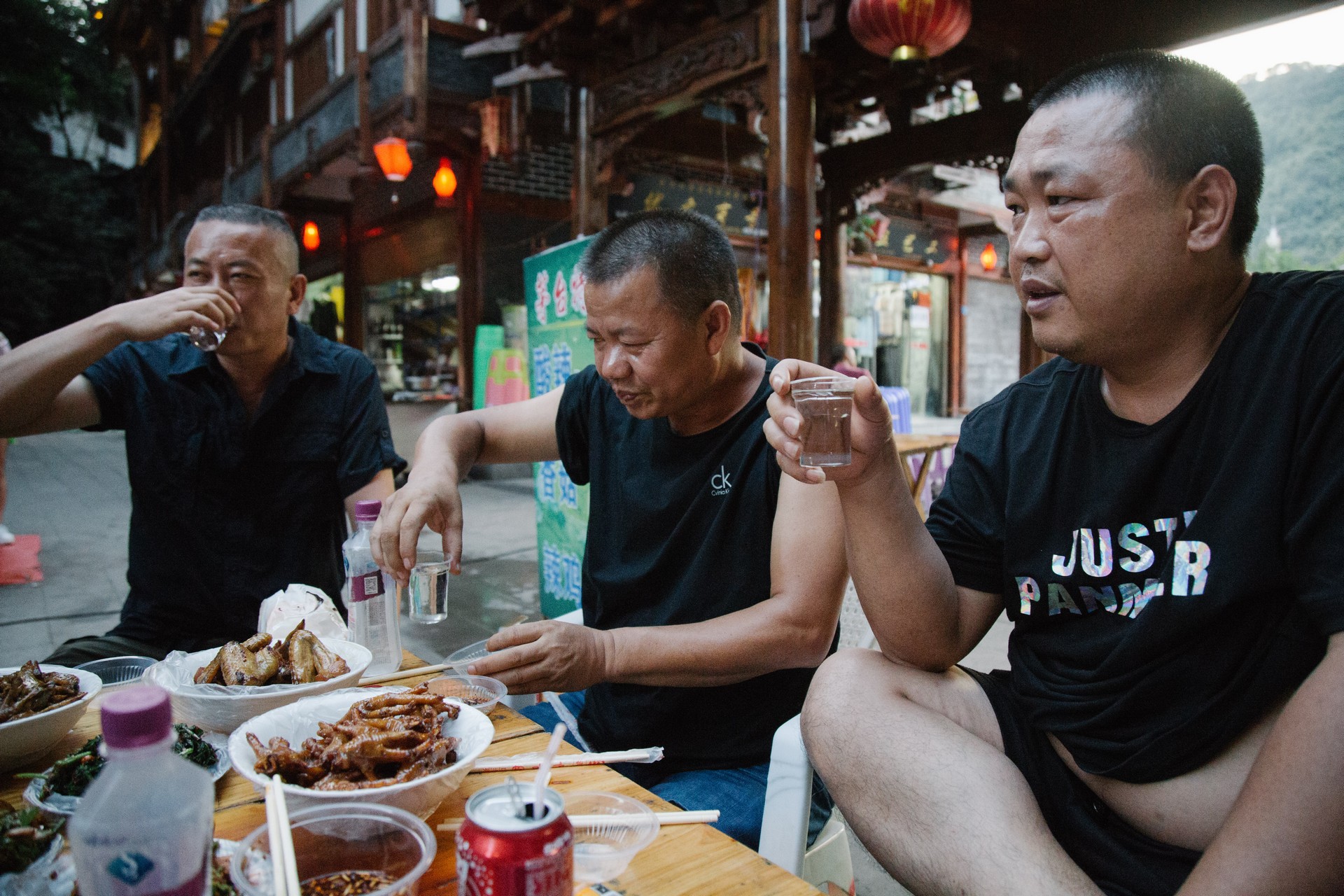
Locals toast with ‘baijiu’ during dinner in Maotai Town, Guizhou province, July 15, 2017.
Maotai Town, too, is attempting to reinvent itself in the wake of the 2012 anti-corruption sweep, which prompted hundreds of the town’s distilleries to close their doors. In the absence of baijiu-generated wealth, the local government has begun developing the town’s tourism industry, focusing on the famous liquor as well as a major battle fought here in 1935 during the Long March of the Red Army — an important milestone in Communist Party history. The town has added a museum dedicated to baijiu, an observation platform, and sightseeing shuttle buses that offer tours of the area. In a bid to lend the town a nostalgic feel, old houses were painted white and their modern roofs exchanged for wooden ones. A play now showing at a local theater centers around the history of baijiu production.
Since losing his job at the liquor factory, Chen has joined the tourism push, opening a Guizhou-style hot pot restaurant along the Chishui River that runs through the town. But there’s been no sign of the hordes of visitors he was hoping to serve, he says. One factor might be the town’s remote location, two-and-a-half hours by car from the nearest major airport in the city of Zunyi. This, at least, is set to change: In October, Maotai opened its own airport — thanks to a 2.44 billion-yuan investment from Kweichow Moutai Group. With flights to 12 cities, including Shanghai and Beijing, the local government hopes to see the airport handle 350,000 passengers a year by 2020.
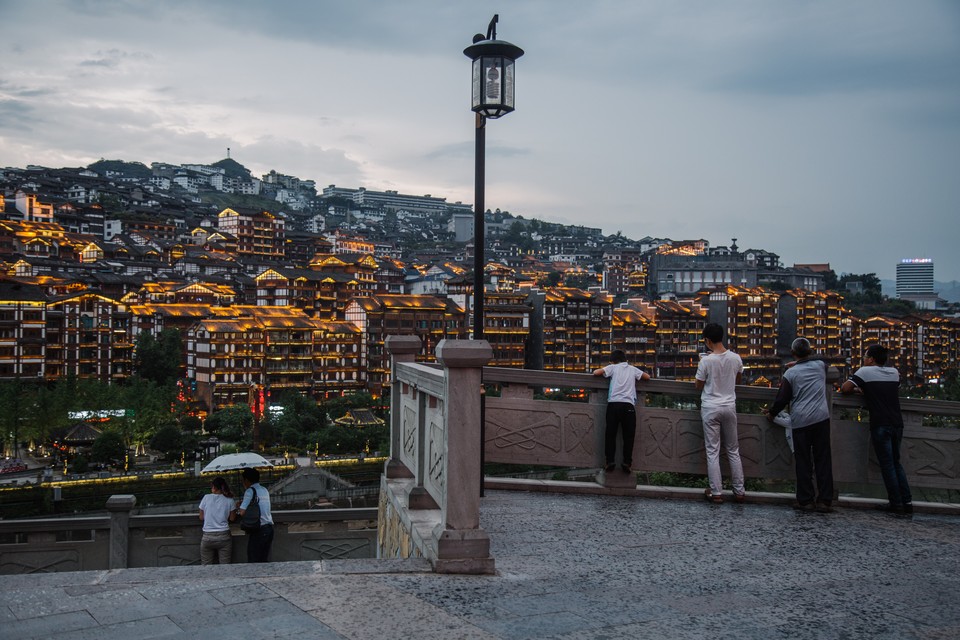
Tourists enjoy a view of Maotai Town, Guizhou province, July 14, 2017.
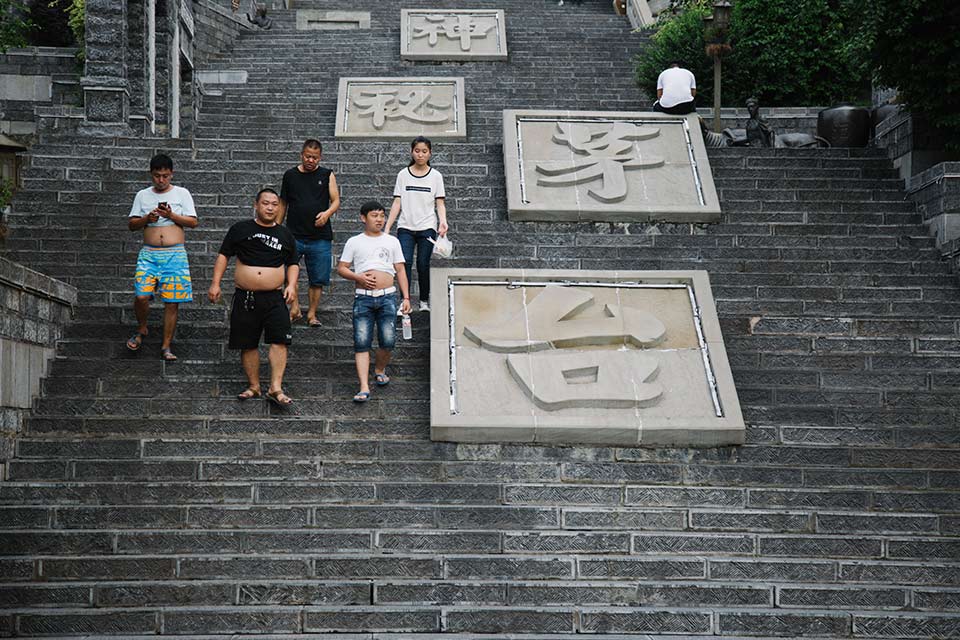
Locals walk toward Maotai Square in Maotai Town, Guizhou province, July 15, 2017.
On top of a sharp drop in sales, the baijiu industry in Maotai is facing its own crackdown as the government attempts to rid the market of unlicensed distillers. Of the roughly 1,600 distilleries still operating in the town of 20,000 people, only around 220 are registered and licensed, according to an official who spoke to Sixth Tone on condition of anonymity, as he was not authorized to speak to the media. Over the past few years, the government has already come down hard on small baijiu producers that lack proper documentation, the official said, adding that the tightened oversight is likely to continue.
The crackdown on unauthorized distilleries could further grow Kweichow Moutai’s dominance by providing opportunities to take over smaller producers, says Zhu Danpeng, an independent food and beverage industry analyst based in the southern city of Guangzhou. At the moment, around 4.5 percent of the baijiu in Maotai Town is made by Kweichow Moutai. Nationwide, sales from China’s top 11 baijiu producers — including Kweichow Moutai — only account for about 11 percent of baijiu market share, according to the Mintel report, underscoring the large number of small-time producers. Consumer behavior is also starting to favor the top brands, Zhu says, as the middle class is drinking less but choosing “famous brands with better quality.”
With most of Maotai still in search of a winning formula, Kweichow Moutai’s success may be crucial to the town’s recovery. At the local baijiu museum, which displays historic bottles and statues of famous connoisseurs like Mao Zedong, visitors are most interested in the Kweichow Moutai products for sale in the gift shop. On the day Sixth Tone visited, bottles fresh from the factory went for 1,980 yuan. No one left empty-handed.